This live blog is now closed; we continue our live coverage here:
Paris attacks: French terrorist named as vigils held around world – as it happened
- This live blog is closed; read our new live blog here
- Attacks ‘carried out by three coordinated teams of gunmen’
- Belgian police make several arrests after Brussels raids
- Attacks were retaliation for France’s bombing in Syria, Isis says
- 129 dead and 352 injured, 99 critically
- How the Paris attacks unfolded
- Read the latest summary
Sun 15 Nov 2015 00.23 EST
First published on Sat 14 Nov 2015 12.47 EST- Summary
- Attacker named as Ismaïl Omar Mostefai
- Where were the victims from?
- Latest Summary
- Exclusive: Greece denies Reuters report on second suspected attacker
- Mexico: two citizens killed, 1 injured in attacks
- Family of one French-born attacker 'detained'
- Greece: second suspected attacker 'likely' entered Europe through Greece
- Paris prosecutor: timeline of the attacks
- Briton killed in Paris named
- One American woman killed during attacks
- The Belgian connection
- Paris prosecutor: seven terrorists died in "coordinated" attacks
- At least one British citizen killed in Paris attacks
- Summary
Live feed
- Summary
- Attacker named as Ismaïl Omar Mostefai
- Where were the victims from?
- Latest Summary
- Exclusive: Greece denies Reuters report on second suspected attacker
- Mexico: two citizens killed, 1 injured in attacks
- Family of one French-born attacker 'detained'
- Greece: second suspected attacker 'likely' entered Europe through Greece
- Paris prosecutor: timeline of the attacks
- Briton killed in Paris named
- One American woman killed during attacks
- The Belgian connection
- Paris prosecutor: seven terrorists died in "coordinated" attacks
- At least one British citizen killed in Paris attacks
- Summary
Summary
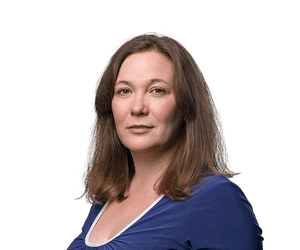
Here is what we now know, as investigations continue into the terror attacks in France:
- Prosecutors say seven attackers, in three groups, staged the six assaults across Paris on Friday evening, killing 129 people.
- 352 people were wounded, with 99 in critical condition. Victims have been identified from 15 different countries.
- The seven attackers also died in the attacks: six blew themselves up with suicide vests – the first-ever suicide bombings on French soil – and one was shot dead by police.
- One of the attackers has been named in French media as Omar Ismaïl Mostefai, a 29-year-old Frenchman from the southern Paris suburb of Courcouronnes. He had been flagged as being close to radical Islam, but had never been linked to terrorism. He was reportedly identified from police fingerprint records as one of the attackers at the Bataclan music venue.
- Mostefai’s brother and father and an unidentified woman have reportedly been taken into police custody, and their homes searched. Mostefai’s older brother told AFP before going to the police station that he had not had contact with his younger brother for several years:
It’s crazy, insane. I was in Paris myself last night, I saw what a mess it was.
- Three people were arrested at the Belgian border, the Paris prosecutor said, and Belgian police made several arrests after raids in Brussels.
- Investigators in France, Belgium, Greece and Germany are involved in efforts to identify the attackers and their network, but Greek authorities have told the Guardian that an earlier report that a second attacker had accessed Europe via Greece was incorrect.
In the space of a few minutes on Friday night, Paris was rocked by six deadly assaults. This account pieces together the sequence of events that left 129 people dead and hundreds injured, in the worst violence witnessed on French soil since the second world war:
Facebook has said that its safety check feature was used by 4.1 million people in Paris to notify friends and family on the social network that they were unharmed after the attacks.
The feature was switched on for users in Paris and its inner suburbs, and Facebook said around 85% of its users in that area used the feature.
Alex Schultz, Facebook’s vice-president of growth, posted to explain why the feature had been activated for the Paris attacks and not for Isis suicide bombings in Beirut on Thursday.
Schultz said the Paris attack was the first occasion that safety check had been used for an event other than a natural disaster, such as the Nepal earthquake:
During an ongoing crisis, like war or epidemic, Safety Check in its current form is not that useful for people: because there isn’t a clear start or end point and, unfortunately, it’s impossible to know when someone is truly ‘safe’ …
There has to be a first time for trying something new, even in complex and sensitive times, and for us that was Paris.
Investigators in France, Belgium, Greece and Germany are involved in efforts to identify the attackers and their network.
One has been identified in French media as Ismaïl Omar Mostefai, a 29-year-old Frenchman from the southern Paris suburb of Courcouronnes. He was reportedly identified from police fingerprint records as one of the attackers who blew themselves up at the Bataclan music venue.
Members of his family, including his father and brother, have been detained by police while their homes are searched.
Three other French nationals have been arrested in Belgium, where they all lived, in connection with the attacks.
Mostefai had been flagged as being close to radical Islam, but had never been linked to terrorism.
Paris police said the attackers appeared to be “seasoned, at first sight, and well trained” and were investigating whether they had ever been to fight in Syria.
President François Hollande said the attacks had been “prepared, organised and planned overseas, with help from inside [France]”.
As the US Democratic debate focuses on the fight against Isis, the Republican front-runner, Donald Trump, has used the Paris attacks to once again propound his theories on the problems of gun control.
At a rally in Texas on Saturday, he told supporters:
When you look at Paris, toughest gun laws in the world, nobody had guns but the bad guys.
And I will tell you what, you can say what you want, if they had guns, if our people had guns, if they were allowed to carry, it would have been a much, much different situation.
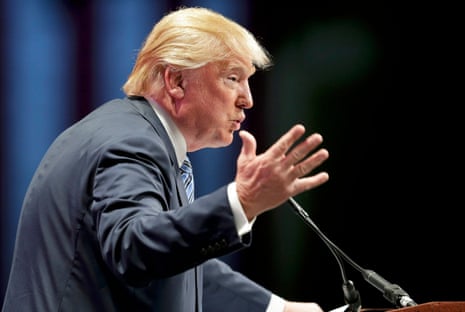
President François Hollande was in the Stade de France to watch the football match between the national team and Germany when news broke of the first of what would be three suicide explosions outside the stadium.
This series of images shows Hollande as he is informed of the news and moved out of the stadium.
In the final image he is seen taking a call about the unfolding emergency at 9.36pm – after the second Stade de France explosion, and at the moment when gunmen were firing at restaurant-goers in the 11th arrondissement.
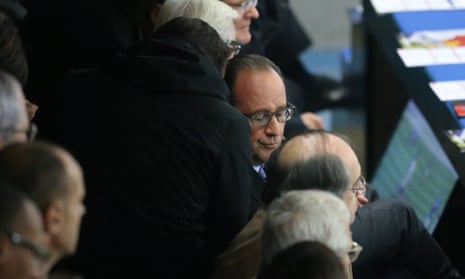


It’s believed that Mostefai was the attacker referred to by the Paris prosecutor, François Molins, who told reporters on Saturday that one of the terrorists was a French national from the southern Paris suburb of Courcouronnes.
The man, born in 1985, had a criminal record and had been flagged as an extremist as early as 2010, the prosecutor said.
Attacker named as Ismaïl Omar Mostefai
One of the attackers has been named in French media as Ismaïl Omar Mostefai.
The 29-year-old Frenchman was identified from a finger found at the site of the Bataclan massacre, Agence France-Presse reports.
This apparently matched fingerprints on police files. Mostefai had a criminal record, but reportedly had not served time in jail.
The brother and father of Mostefai have been taken into police custody, and their homes have been searched.
Mostefai’s older brother reportedly told AFP before going to the police station that he had not had contact with his younger brother for several years:
It’s crazy, insane. I was in Paris myself last night, I saw what a mess it was.
France plans to go ahead with a global climate change summit in Paris at the end of the month despite a wave of deadly attacks that killed 129 people in the capital, Australian Associated Press reports.
The conference “will be held because it’s an essential meeting for humanity”, prime minister Manuel Valls told TF1 television. He said the summit would also be an opportunity for world leaders to show their solidarity with France after the attacks.
About 118 world leaders are expected to attend the opening day of the conference, which runs from 30 November to 11 December and is due to nail down a global deal to limit rising greenhouse gas emissions.
In Washington, officials confirmed that US president Barack Obama and secretary of state John Kerry still planned to attend. Overall, between 20,000 and 40,000 delegates are expected.
“Security at UN climate conferences is always tight but understandably it will be even tighter for Paris,” said Nick Nuttall, spokesman of the UN climate change secretariat in Bonn. The United Nations has the main responsibility for security inside the conference venue at Le Bourget, to the north of the capital.
Organisers of a march to press for climate action planned for Paris on 29 November, the eve of the summit, said they would meet on Monday “to discuss ways forward”, said Alice Jay, director of the citizens’ campaign group Avaaz and one of the organisers.
Where were the victims from?
As more information trickles in about Friday night’s attack, several overseas victims have been identified among the 129 deceased and 352 wounded, as well, of course, as many French people.
This list has been compiled from information from Associated Press, and numbers and details could change.
The victims
- Algeria: two Algerians were killed, the official APS news agency said, citing diplomatic sources as saying the victims were a woman aged 40 and a man aged 29.
- Belgium: At least three Belgians including a dual French national were killed, according to the Belgian foreign ministry.
- Brazil: two Brazilians were wounded in the attacks, president Dilma Rousseff said.
- Britain: one Briton was killed, identified as Nick Alexander. The UK foreign office has said “a handful” were feared dead.
- Chile: One man and a woman – the niece of Chile’s ambassador to Mexico – were among the dead.
- Mexico: two of its citizens lost their lives in the attacks on Friday night. Both held dual nationalities, the foreign ministry said on Saturday. One of the women who holds dual citizenship with the US, is suspected to be Nohemi Gonzalez.
- Morocco: one Moroccan has been killed and another injured, according to the embassy in France.
- Portugal: two Portuguese nationals are reported to have died, according to the Lisbon government. A 63-year-old national who lived in Paris and worked in public transport was killed near the Stade de France, while the second victim, killed at the Bataclan, was a dual-national born in France in 1980.
- Romania: two Romanians were killed, according to the foreign ministry in Bucharest.
- Spain: 29-year-old Alberto Gonzalez Garrido was killed while attending the concert at the Bataclan, Spanish authorities said.
- Sweden: one person of Swedish nationality was wounded by gunfire and another was killed, according to the foreign ministry, which said it was still verifying the information.
- Switzerland: reports that citizens were injured.
- Tunisia: Two young Tunisians, sisters who lived in the French region of Creusot and who were celebrating a friend’s birthday in Paris, were also killed, according to the Tunisian foreign ministry.
- United States: Twenty-three-year old Nohemi Gonzalez, a student from California was killed in the attacks, her university said. She is thought to also hold Mexican citizenship and could be the second of two women identified by the Mexican government as deceased in the attack. Other Americans are reported to be injured.
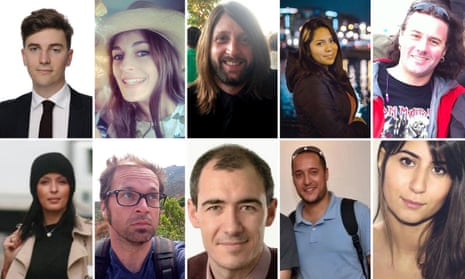
In the US, candidates for the Democratic nomination for president have opened their latest televised debate with a minute’s silence for the victims of the Paris attacks.
The three candidates expressed their shock and disgust at the events of Friday night, with Hillary Clinton saying prayers were “not enough”:
We need to have a resolve that will bring the world together to root out the kind of radical jihadist ideology that motivates organisations like Isis .
You can follow updates on our debate live blog:
The deadliest of the attacks was at the Bataclan music venue, where at least 89 people were killed, along with three of the attackers.
All the musicians performing with the California-based rock band Eagles of Death Metal were unharmed, but a member of their entourage and a member of their record label team were killed.
The family of Nick Alexander, a 36-year-old Briton who was the band’s merchandise manager, said:
Nick died doing the job he loves and we take great comfort in knowing how much he was cherished by his friends around the world.
Also killed was a Mercury Records executive, Thomas Ayad, 34, part of a team from the band’s parent label, Universal Music Group, attending the concert, the company said.

After the confusion of Friday night, more clarity is emerging about the attackers involved in the synchronised atrocities.
While police still investigate their identities, we now know that seven terrorists died in the course of the attacks.
Six of them blew themselves up – the first-ever suicide bombings on French soil.
Two gunmen detonated suicide belts as police stormed the Bataclan music venue, and a third was shot by police.
Three suicide bombers also detonated their explosives outside the Stade de France stadium.
The seventh attacker blew himself up on a busy street near the concert hall, also injuring one other person.
Latest Summary
Here’s where things stand:
- The number of dead rose to 129, while the number of wounded rose to 352, with 99 in critical condition, Paris prosecutor François Molins said in a press conference on Saturday
- The attacks were ‘carried out by three coordinated teams of gunmen’, Molins said, adding that seven suspected attackers were killed on Friday night. One attacker was French, and was known to police. The Associated Press reported that members of his family have been detained
- Molins gave a rough timeline of the attacks. The Guardian has put together a short video on how the events unfolded
- Three people were arrested at Belgian border, Molins said. Belgian police made several arrests after the Brussels raids
- The attacks were retaliation for France’s bombing in Syria, the Islamic State militant group has said
- Greek authorities have told the Guardian that an earlier Reuters report that a second attacker had accessed Europe via Greece was incorrect.
That’s it from us in New York. My colleague Claire Phipps (@Claire_Phipps) will now be taking over the blog from Sydney.
Leaders around the Arab world condemned Friday’s attacks in Paris. King Abdullah of Jordan voiced his “anger over the cowardly terrorist attack in the French capital,” while the Saudi King sent his condolences to French President François Hollande.
But Syrian President Bashar al-Assad said that Friday’s attacks in Paris were a result of France’s backing of the Syrian opposition in its quest to topple his regime.
According to the Wall Street Journal, Assad told a visiting delegation of French lawmakers and journalists that he was ready to cooperate with the French government in the battle against Islamic State, if the French abandoned their stated goal of regime change in Syria.
“Act in the interest of your people,“ Mr. Assad said, referring to the foreign policy of French President François Hollande. ”The first question asked by every French citizen today is, ‘Have the French policies over the past five years brought any good to the French people?’ The answer is no, so what I ask him to do is to act in the interest of the French people—which means changing his policies.”
Meanwhile in Beirut, the head of Lebanon’s Hezbollah movement, Hassan Nasrallah, strongly condemned Isis’ attack on Paris.
“We, Hezbollah, express our strong condemnation and denunciation of the terrorist attack by the criminals of Daesh in Paris,” he said in a televised address, using the Arabic acronym for the jihadist group.
Expressing his solidarity with the French people, he said the Middle East was also suffering “the earthquake” of jihadist groups.
Tensions in Beirut have run high since Thursday, when a twin suicide attack hit a densely populated suburb of the capital, killing 43 and wounding more than 200. The attack was claimed by Isis.
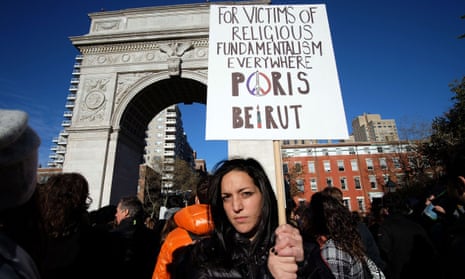
The New York Times Beirut bureau chief wondered on Facebook why the check in feature on Facebook, where Parisians could alert friends and family that they were “safe”, had not been deployed for Beirut’s Isis attack on Thursday. Facebook replied that Paris was “the first time we tried it on a case that isn’t a natural disaster.”
Florence Hartmann has written about waking up in Paris the day after the attacks to an eerie silence:
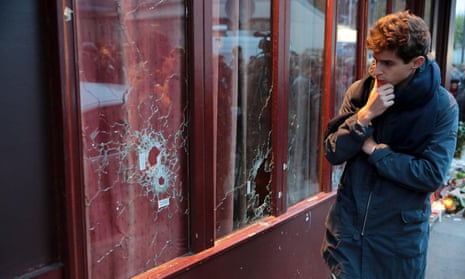
When I awoke on Saturday morning, I almost enjoyed the terrifying silence on Boulevard Montparnasse – no attacks were perpetrated on the Left Bank of the Seine, where I live. I had wondered whether the streets would be deserted, – they were – or whether there would be this defiant “normality”, as followed the attacks on Charlie Hebdo. Perhaps that will come later.
[...] Many believe there was a rational explanation behind the Charlie Hebdo attack in January – the caricatures of Mohammed – as well as behind the Kosher supermarket attack two days later. The victims at Charlie Hebdo and the shop were intentionally targeted as members of specific groups, because of their opinions or religion. This time, it is blind violence against random targets. Paris has discovered something it did not taste 10 months ago, a feeling that belongs to war zones: that violent death could come to anyone, anywhere, at any time.
Since Friday night, Parisians have been afraid, really afraid. Even before the authorities ordered people to stay where they were, most of the crowds in the area of the attacks had rushed into surrounding buildings, asking for refuge in an any occupied apartment.
The New York Times reports that the FBI is sending agents to Paris to assist in the investigation:
The F.B.I. is sending agents to Paris to assist with investigation .. https://t.co/zQxKKwCs9C
— Michael S. Schmidt (@nytmike) November 15, 2015